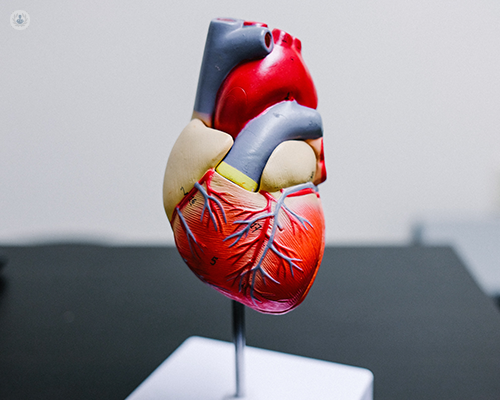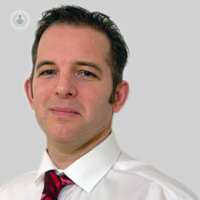TAVI for aortic stenosis (part 1): The risks and benefits
Written by:TAVI stands for “trans-catheter aortic valve implantation” and is sometimes also called TAVR (trans-catheter aortic valve replacement). It is a keyhole; X-ray guided method of delivering a new heart valve to patients with aortic valve disease. Leading consultant interventional cardiologist Dr Christopher Malkin considers the risks and benefits of the procedure.

What is the aortic valve?
The aortic valve is a one-way valve that separates the heart from the circulation around the body. A healthy valve is thin and flexible, and opens passively with the blood flow. It allows blood out of the heart and closes to prevent any leaks back into the valve.
TAVI for aortic stenosis
TAVI is typically used to treat aortic stenosis, a condition in which the valve becomes rigid and narrowed. This puts more pressure on the heart and makes it harder for it to function. Over time and without treatment, the heart will fail and patients with severe aortic stenosis may become very ill with breathlessness, chest pain and dizziness.
The alternative to TAVI
TAVI is just one of the ways to treat aortic stenosis, the main other treatment is with open surgery for aortic valve replacement.
In the UK and the developed world, TAVI has now become the most common method to treat aortic stenosis. Historically, TAVI was only used in patients who were very elderly or frail and were considered too high risk for open surgery. However, the evolving data has found TAVI to be highly effective and safe with a much faster recovery when compared to open surgery.
When is treatment needed?
Aortic stenosis is a serious condition. Once you experience symptoms such as breathlessness, the heart is already under serious strain and plans for treatment need to be made rapidly. Milder forms of aortic stenosis require monitoring usually annually in a clinic with regular heart scans.
When we recommend TAVI
If you are under the age of 65, we will most likely recommend surgery. If you are over the age of 80, we will most likely always recommend TAVI. There is a big grey zone for people age 65 to 80, where several factors influence the decision:
- The patient’s general health
- Their frailty
- Their size
- Other cardiac problems
- The anatomy of their aortic valve
No one wants to have to undergo open-heart surgery or TAVI, but if you have symptomatic aortic stenosis, it is essential to get treatment.
The benefits and risks of TAVI
The benefits of treatment are:
- The relief from symptoms (breathlessness, chest pain, dizziness)
- The protection and prolongation of life (when compared to no treatment)
The risks of TAVI are as follows:
- A 1% risk of death
- A 1-2% risk of a disabling stroke
- A 2% risk of any other serious problem (e.g. bleeding, heart attack, sub-optimal valve function)
Therefore, the overall serious complication rate is 4 to 5 per cent.
There is also risk of needing a pacemaker after TAVI, but this is not regarded as a serious complication. The risks are approximately 10%
Comparing the risks of TAVI with open surgery
The risks for open surgical valve replacement are similar to TAVI, except the risk of bleeding is higher, and the risks of a valve leak and needing a permanent pacemaker are lower.
Recovery time
The big advantage of TAVI compared to open surgery is the recovery time. With TAVI, recovery takes a few days but with open surgery, it can take several months.
The treatment of other conditions
The advantage of open surgery over TAVI is that other cardiac problems can be treated at the same time, such as other valve problems or blocked arteries.
Worn out tissue
One final issue is that tissue valves can wear out over time after both TAVI and open surgery. If the valve does become worn out, the valve can usually be re-treated. It is usually easier to re-treat surgical valves and this is why younger patients with a normal lifespan are normally recommended open surgery as the first treatment.
Speak to your doctor
Listen to your doctor carefully. There will always be a case conference about your specific care and in this meeting, you’ll have your recommended treatment explained. Sometimes, there are specific and important reasons for recommending a particular treatment. In other cases, both options may be reasonable and your personal views will define the decision.
In part 2, I go through how you’ll be prepared for TAVI, I explain in detail how it’s performed, and I clarify the length and process of recovery.
Dr Chris Malkin is a specialist in the TAVI procedure. Take a look at Dr Malkin’s profile to discover how he can help you take care of your heart.


